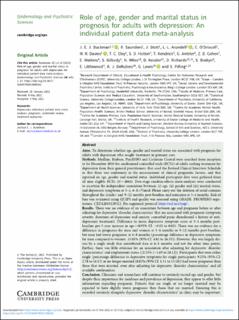| dc.contributor.author | Buckman, Joshua E.J. | |
| dc.contributor.author | Saunders, Rob | |
| dc.contributor.author | Stott, Joshua | |
| dc.contributor.author | Arundell, Laura-Louise | |
| dc.contributor.author | O'Driscoll, Ciarán | |
| dc.contributor.author | Davies, Molly R. | |
| dc.contributor.author | Eley, Thalia C. | |
| dc.contributor.author | Hollon, Steven D. | |
| dc.contributor.author | Kendrick, Tony | |
| dc.contributor.author | Ambler, Gareth | |
| dc.contributor.author | Cohen, Zachary Daniel | |
| dc.contributor.author | Watkins, Edward | |
| dc.contributor.author | Gilbody, Simon | |
| dc.contributor.author | Wiles, Nicola | |
| dc.contributor.author | Kessler, David | |
| dc.contributor.author | Richards, David A | |
| dc.contributor.author | Brabyn, Sally | |
| dc.contributor.author | Littlewood, Elizabeth | |
| dc.contributor.author | DeRubeis, Robert J. | |
| dc.contributor.author | Lewis, Glyn | |
| dc.contributor.author | Pilling, Stephen | |
| dc.date.accessioned | 2022-03-09T09:16:13Z | |
| dc.date.available | 2022-03-09T09:16:13Z | |
| dc.date.created | 2021-07-07T14:28:41Z | |
| dc.date.issued | 2021 | |
| dc.identifier.citation | Buckman, J. E. J., Saunders, R., Stott, J., Arundell, L. L., O'Driscoll, C., Davies, M. R., . . . Pilling, S. (2021). Role of age, gender and marital status in prognosis for adults with depression: An individual patient data meta-analysis. Epidemiology and Psychiatric Sciences, 30: e42. | en_US |
| dc.identifier.issn | 2045-7960 | |
| dc.identifier.uri | https://hdl.handle.net/11250/2983910 | |
| dc.description.abstract | Aims
To determine whether age, gender and marital status are associated with prognosis for adults with depression who sought treatment in primary care.
Methods
Medline, Embase, PsycINFO and Cochrane Central were searched from inception to 1st December 2020 for randomised controlled trials (RCTs) of adults seeking treatment for depression from their general practitioners, that used the Revised Clinical Interview Schedule so that there was uniformity in the measurement of clinical prognostic factors, and that reported on age, gender and marital status. Individual participant data were gathered from all nine eligible RCTs (N = 4864). Two-stage random-effects meta-analyses were conducted to ascertain the independent association between: (i) age, (ii) gender and (iii) marital status, and depressive symptoms at 3–4, 6–8,<Vinod: Please carry out the deletion of serial commas throughout the article> and 9–12 months post-baseline and remission at 3–4 months. Risk of bias was evaluated using QUIPS and quality was assessed using GRADE. PROSPERO registration: CRD42019129512. Pre-registered protocol https://osf.io/e5zup/.
Results
There was no evidence of an association between age and prognosis before or after adjusting for depressive ‘disorder characteristics’ that are associated with prognosis (symptom severity, durations of depression and anxiety, comorbid panic disorderand a history of antidepressant treatment). Difference in mean depressive symptom score at 3–4 months post-baseline per-5-year increase in age = 0(95% CI: −0.02 to 0.02). There was no evidence for a difference in prognoses for men and women at 3–4 months or 9–12 months post-baseline, but men had worse prognoses at 6–8 months (percentage difference in depressive symptoms for men compared to women: 15.08% (95% CI: 4.82 to 26.35)). However, this was largely driven by a single study that contributed data at 6–8 months and not the other time points. Further, there was little evidence for an association after adjusting for depressive ‘disorder characteristics’ and employment status (12.23% (−1.69 to 28.12)). Participants that were either single (percentage difference in depressive symptoms for single participants: 9.25% (95% CI: 2.78 to 16.13) or no longer married (8.02% (95% CI: 1.31 to 15.18)) had worse prognoses than those that were married, even after adjusting for depressive ‘disorder characteristics’ and all available confounders.
Conclusion
Clinicians and researchers will continue to routinely record age and gender, but despite their importance for incidence and prevalence of depression, they appear to offer little information regarding prognosis. Patients that are single or no longer married may be expected to have slightly worse prognoses than those that are married. Ensuring this is recorded routinely alongside depressive ‘disorder characteristics’ in clinic may be important. | en_US |
| dc.language.iso | eng | en_US |
| dc.publisher | Cambridge University Press | en_US |
| dc.rights | Navngivelse 4.0 Internasjonal | * |
| dc.rights.uri | http://creativecommons.org/licenses/by/4.0/deed.no | * |
| dc.title | Role of age, gender and marital status in prognosis for adults with depression: An individual patient data meta-analysis | en_US |
| dc.type | Peer reviewed | en_US |
| dc.type | Journal article | en_US |
| dc.description.version | publishedVersion | en_US |
| dc.rights.holder | © The Author(s), 2021. | en_US |
| dc.source.pagenumber | 13 | en_US |
| dc.source.volume | 30 | en_US |
| dc.source.journal | Epidemiology and Psychiatric Sciences (EPS) | en_US |
| dc.identifier.doi | 10.1017/S2045796021000342 | |
| dc.identifier.cristin | 1920747 | |
| dc.source.articlenumber | e42 | en_US |
| cristin.ispublished | true | |
| cristin.fulltext | original | |
| cristin.qualitycode | 1 | |

